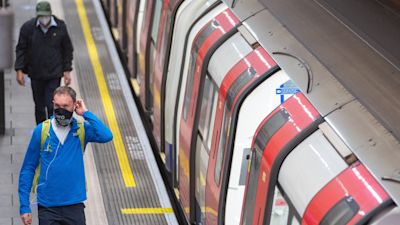Mask-wearing 'openly ignored on a large scale' on London Underground

London Underground workers are facing potential danger as mask-wearing is now being “openly ignored” on a large scale, unions have warned.
Union officials and passengers say there has been a noticeable decline in the number of Tube users wearing face masks despite messages saying it is a requirement when travelling.
Around 500 uniformed enforcement officers continue to ask customers to comply, and since the national rules ceased to apply in July, Transport for London said it has refused entry to 408 people and asked 126 to leave services.
Mick Whelan, general secretary of the train drivers’ union Aslef, said: “We believe mask-wearing should be mandatory on trains, to protect passengers and staff and to control the covid-19 pandemic.
“It is mandatory, but not enforced, on TfL and we have noticed a decline in recent days in the number of passengers wearing masks.
“If you go to Euston station and walk around the platforms, you will see it is mandatory on London Underground and London Overground but not on the main line operators running into and out of the station.”
Mick Lynch, general secretary of the Rail, Maritime and Transport (RMT) union said: “Staff members on London Underground are put in an invidious and potentially dangerous situation as mask-wearing on TFL, a condition of carriage, is now being openly ignored on a large scale.
“This is an issue for the Mayor to address as enforcement falls to him, not frontline Tube staff. The situation isn’t helped by the cavalier approach to Covid protocols displayed by the Prime Minister on an almost daily basis.
“It’s no wonder there’s talk of new restrictions and controls if we can’t even deliver the basics.”
A TfL spokesman said: “Covid is still with us and we all have a role to play in doing the right thing and keeping each other safe.
“Despite the Government removing the national requirement to wear a face covering on public transport, wearing a face covering on our services and in our stations is still required under TfL’s condition of carriage.
“Our 500 uniformed enforcement officers continue to ask customers to comply with the rules of our network.
“Since the national rules ceased to apply on 19 July, we have refused entry to 408 people and asked 126 to leave our services.
“We are also handing out more face coverings to help our customers do the right thing and keep each other safe. Anybody who does not comply may be refused entry to our services.”
London Mayor Sadiq Khan said: “Coronavirus has not disappeared and, with cases rising again and people’s health and the NHS still at significant risk this winter, it’s vital that people take measures to protect themselves and others, including wearing face masks in enclosed spaces, such as the public transport network.
“That is why I kept the requirement for face coverings to be worn on TfL’s network as a condition of carriage after 19 July. While most Londoners continue to do the right thing and wear one, it is clear the changes brought in by the Government have given passengers mixed signals and affected compliance.
“The evidence that face masks can make a substantial contribution towards lower transmission is getting stronger all the time.
“I continue to urgently lobby ministers to bring back this requirement and enable British Transport Police officers to enforce the wearing of face coverings across all TfL services.
“TfL enforcement officers continue to be out on the transport network and can prevent those who refuse to wear a face covering from using transport services, but they can’t be everywhere.”
Transport Salaried Staffs Association (TSSA) general secretary Manuel Cortes said: “There can be no doubt that wearing face coverings protects both transport workers and passengers.
“Sadly, we remain in the midst of a deadly pandemic and it’s vital that coverings are used across the London Underground, wider Transport for London services and public transport as a whole.
“Our union is all too aware of the sacrifices made by the many brave transport workers who have stood on the front line throughout this Covid crisis.”